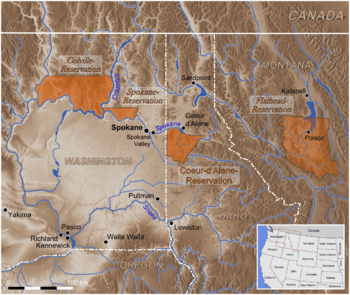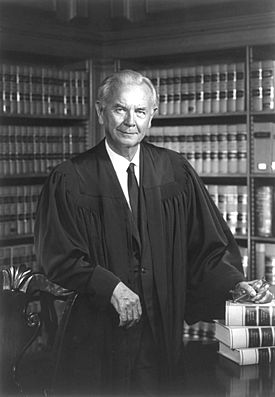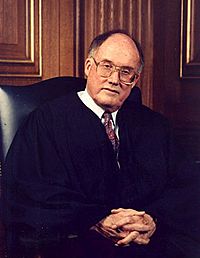Antoine v. Washington facts for kids
Quick facts for kids Antoine v. Washington |
|
|---|---|

|
|
| Argued December 16, 1974 Decided February 19, 1975 |
|
| Full case name | Alexander J. Antoine, et ux. v. State of Washington |
| Citations | 420 U.S. 194 (more)
95 S. Ct. 944; 43 L. Ed. 2d 129
|
| Prior history | State v. Antoine, 511 P.2d 1351 (Wash. 1973) |
| Argument | Oral argument |
| Holding | |
| 1. Treaties and laws must not be construed to the prejudice of Native Americans (Indians).
2. The Supremacy Clause precludes the application of state game laws to the tribe. 3. Congress showed no intent to subject the tribe to state jurisdiction for hunting. 4. While the state can regulate non-Indians in the ceded area, Indians must be exempted from such regulations. |
|
| Court membership | |
| Case opinions | |
| Majority | Brennan, joined by Burger, White, Marshall, Blackmun, Powell |
| Concurrence | Douglas |
| Dissent | Rehnquist, joined by Stewart |
| Laws applied | |
| U.S. Const. art. VI, § 2 | |
Antoine v. Washington was an important case decided by the Supreme Court of the United States in 1975. The Court ruled that agreements and laws made with Native American tribes must be understood in a way that benefits the tribes. It also said that states cannot make their own hunting laws apply to tribes if those laws go against federal agreements. This case was about protecting the hunting rights of the Colville Confederated Tribes in Washington state.
Contents
What Happened in the Case?
This case was about whether the state of Washington could stop members of the Colville Confederated Tribes from hunting on land that used to be part of their reservation.
The Colville Tribes' History
The Colville Indian Reservation was created in 1872 in Washington state. It was home to twelve different Native American tribes. These tribes included the Chelan, Colville, Entiat, Methow, Nespelem, Nez Perce, Okanagan, Palus, Sanpoil, Sinixt, Sinkiuse-Columbia, and Wenatchi.
In 1891, the tribes made an agreement with the U.S. government. They agreed to give up the northern half of their reservation land. In return, the government promised to pay them money. The agreement also said that the tribes would keep their rights to hunt and fish on this land. This land was called "ceded land" because it was given up.
In 1892, Congress passed a law about this agreement. However, the law did not clearly mention the hunting and fishing rights.
The Lower Courts' Decisions
Alexander Antoine and his wife, Irene, were members of the Colville Confederated Tribes. In 1971, they were hunting deer on the northern part of the land that had been given up. They were hunting during a time when it was not allowed by Washington state law.
They were charged and found guilty by a state court. The Antoines and their tribe argued that the 1891 agreement protected their right to hunt. They said this agreement was like a treaty. Treaties are very powerful under the U.S. Constitution's Supremacy Clause. This clause means federal laws and treaties are above state laws.
However, the state of Washington argued that the agreement was just a simple contract, not a treaty. They said a contract could not stop the state from making its own hunting laws. The Washington Supreme Court agreed with the state. So, the Antoines and the tribe took their case to the Supreme Court of the United States.
The Supreme Court's Decision
The U.S. Supreme Court heard the arguments from both sides.
What Each Side Argued
The Antoines' lawyer argued several key points:
- Agreements with Native American tribes should always be understood in a way that helps the tribes. This is known as the "Indian canon" of law.
- When land is set aside for tribes, they usually keep their hunting and fishing rights unless the agreement clearly says otherwise.
- States generally cannot control hunting on reservation lands.
- The 1891 agreement was made into a federal law by Congress. This means it is covered by the Supremacy Clause and is binding on states.
The state of Washington argued:
- The 1891 agreement was not a treaty, so the Supremacy Clause did not apply.
- It was just a contract, and the state was not part of that contract.
- Since the land was no longer a reservation, Washington had the right to control hunting there.
The U.S. government, through its Solicitor General, supported the Antoines and the tribe.
The Court's Opinion
Justice William J. Brennan, Jr. wrote the main opinion for the Supreme Court. He agreed with the Antoines.
- He said that the "Indian canon" of law was very important. This rule means that agreements with tribes should always be read in their favor.
- Justice Brennan explained that once Congress passed a law to make the 1891 agreement happen, it became a federal law. This meant the Supremacy Clause applied. State laws could not go against this federal law.
- Even though the federal law didn't specifically say the tribes kept hunting rights, the original agreement did. Since the law was based on that agreement, the hunting rights were still protected. The agreement said these rights "shall not be taken away."
Because of this, the Supreme Court overturned the lower court's decision. This meant the Antoines were not guilty.
What Others Said
Justice William O. Douglas agreed with the main opinion. He simply stated that a state cannot stop a right that Congress gave to Native Americans. This is because of the Supremacy Clause.
Justice William Rehnquist disagreed with the Court's decision. He felt that Washington's hunting laws could only be stopped by a clear treaty or a specific federal law. He argued that the law Congress passed did not specifically mention hunting or fishing rights. He believed that if Congress wanted to protect those rights, it should have written them clearly into the law.
 | Roy Wilkins |
 | John Lewis |
 | Linda Carol Brown |




